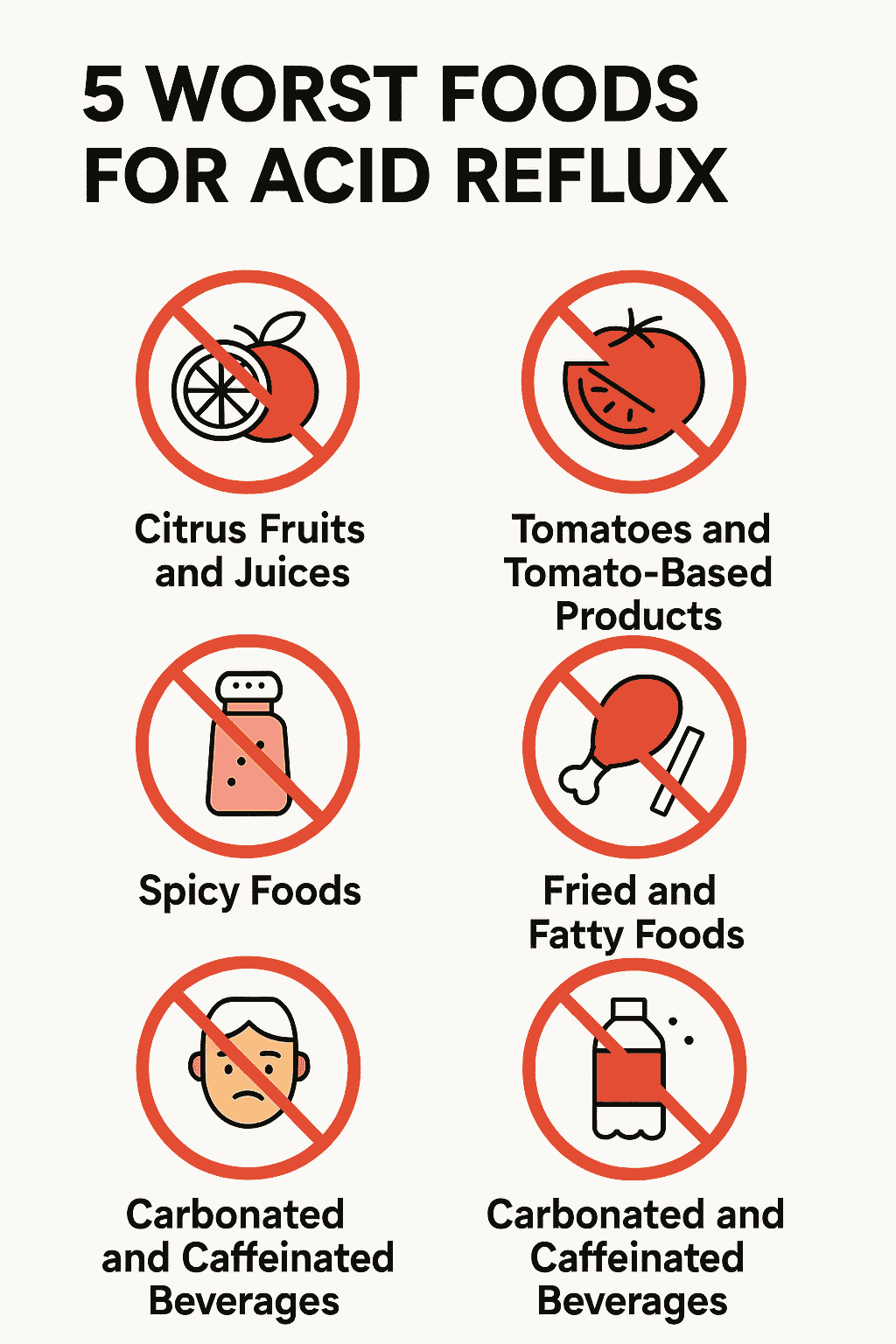Top 5 Worst Foods for Acid Reflux: What to Avoid
Acid reflux, also known as gastroesophageal reflux disease (GERD), is a common digestive disorder characterized by the backward flow of stomach acid into the esophagus. This can lead to discomfort, heartburn, and irritation. While certain foods can trigger or exacerbate acid reflux symptoms, making informed dietary choices is essential for managing this condition effectively. Here are the top five worst foods to avoid if you suffer from acid reflux:


Citrus Fruits and Juices:
Citrus fruits like oranges, grapefruits, lemons, and limes are highly acidic, which can contribute to acid reflux symptoms. The high acidity level can irritate the esophagus and exacerbate heartburn. Additionally, citrus juices can also have the same effect due to their acidity. If you enjoy these fruits, consider consuming them in moderation and opt for low-acid varieties whenever possible.
Tomatoes and Tomato-Based Products:
Tomatoes and tomato-based products like tomato sauces, ketchup, and salsa are also highly acidic and can trigger acid reflux symptoms. The acidity in these foods can relax the lower esophageal sphincter (LES), the muscle that separates the stomach from the esophagus, allowing stomach acid to flow back into the esophagus. If you're prone to acid reflux, it's advisable to limit your consumption of these items.
Spicy Foods:
Spicy foods, including hot peppers, chili, and spicy sauces, can irritate the esophagus and worsen acid reflux symptoms. Spices can relax the LES, making it easier for stomach acid to escape into the esophagus. If you enjoy spicy flavors, consider using milder spices and seasonings to reduce the risk of triggering acid reflux.
Fried and Fatty Foods:
Fried and fatty foods can slow down digestion and lead to the relaxation of the LES. This can result in increased pressure on the stomach, allowing stomach acid to flow upward. Examples of such foods include fried chicken, French fries, and high-fat desserts. Opt for lean protein sources and healthier cooking methods to minimize the impact of fried and fatty foods on your acid reflux symptoms.
Carbonated and Caffeinated Beverages:
Carbonated beverages like soda and caffeinated drinks like coffee and tea can contribute to acid reflux in several ways. Carbonation can increase stomach pressure, leading to the backflow of acid. Caffeine can relax the LES and stimulate stomach acid production. Furthermore, many caffeinated beverages are acidic in nature, which can further exacerbate symptoms. Choosing non-carbonated and non-caffeinated options, such as herbal teas or water, can help reduce the risk of acid reflux.
Foods to Eat for Acid Reflux: A Guide to Soothing Your Symptoms
Managing acid reflux isn’t only about avoiding trigger foods—it’s also about incorporating nourishing options that help soothe the digestive system. While everyone’s triggers are unique, many people find relief by including the following foods in their diet:
1. Whole Grains & Oatmeal
Whole grains like oatmeal, brown rice, and quinoa are rich in fiber and help absorb excess stomach acid. Starting your day with a bowl of oatmeal can provide a gentle, filling meal that keeps reflux at bay.
2. Non-Citrus Fruits
Fruits such as bananas, apples, pears, and melons are less acidic than citrus fruits. They can satisfy your sweet cravings while providing vitamins and fibre that promote digestive health.
3. Vegetables
Leafy greens (like spinach and kale), broccoli, and asparagus are excellent choices. These vegetables are naturally low in fat and acid, making them a safe option to include in meals throughout the day.
4. Lean Proteins
Opt for lean proteins such as skinless chicken, turkey, and fish. These protein sources are less likely to trigger reflux compared to higher-fat meats and can be easily incorporated into a variety of dishes.
5. Ginger
Ginger is renowned for its natural anti-inflammatory properties and can help reduce nausea and inflammation. Try adding a small amount of fresh ginger to stir-fries or steeping ginger tea for a soothing drink.
6. Healthy Fats in Moderation
While high-fat foods can trigger reflux, moderate amounts of healthy fats—such as those from avocado or a small handful of nuts—can be beneficial when balanced with other reflux-friendly ingredients.
7. Herbal Teas
Non-caffeinated, herbal teas like chamomile or liquorice tea can help relax the digestive tract and reduce acid production. Enjoying a warm cup between meals may aid in symptom relief.
Tips for Success
- Keep a Food Diary: Track what you eat and your symptoms to identify personal triggers.
- Eat Smaller, Frequent Meals: Large meals can increase stomach pressure and lead to reflux.
- Stay Upright After Eating: Allow your body time to digest by avoiding lying down immediately after meals.
Incorporating these foods can provide a balanced approach to managing acid reflux while still enjoying a varied diet. Experiment with different combinations to find what works best for your body, and consider pairing this dietary advice with lifestyle changes for optimal results.
Frequently Asked Questions (FAQs)
How can I prevent acid reflux symptoms?
Preventing acid reflux involves making dietary and lifestyle changes. Avoid trigger foods, eat smaller meals, avoid lying down immediately after eating, and maintain a healthy weight.
Are there natural remedies for acid reflux?
Yes, some people find relief from acid reflux through natural remedies like chewing gum, drinking ginger tea, or raising the head of the bed.
Can I still enjoy citrus fruits if I have acid reflux?
While it's best to limit highly acidic fruits like citrus, some people may tolerate small amounts. Opt for low-acid citrus fruits and consume them in moderation.
Is it okay to drink coffee with acid reflux?
Coffee is a known trigger for acid reflux due to its caffeine content and acidity. If you experience acid reflux, consider switching to low-acid or decaffeinated coffee or herbal teas.
In conclusion, making wise food choices is essential for managing acid reflux effectively. By avoiding or limiting the consumption of highly acidic, spicy, fatty, and caffeinated foods, individuals can reduce the frequency and severity of their symptoms. If you suffer from acid reflux, consulting a healthcare professional or a registered dietitian can provide personalized guidance on developing a diet that minimizes discomfort and promotes digestive well-being.
Are red bell peppers bad for acid reflux?
Red bell peppers are generally considered safe for acid reflux as they are low in acid. However, some individuals may find that raw or spicy peppers can trigger irritation or discomfort. If you're prone to acid reflux, it's best to eat them in moderation and observe how your body reacts.
why do green peppers give me heartburn?
Green peppers may cause heartburn for some people because they are a bit higher in acid compared to red bell peppers. They can also be a bit more difficult to digest, which may trigger acid reflux or irritation in the esophagus. Additionally, some individuals may have a sensitivity to certain vegetables like peppers, which can lead to discomfort.
Is tomato basil soup good for an upset stomach?
Tomato basil soup can be soothing for some people with an upset stomach, but for others, the acidity of tomatoes may worsen symptoms like heartburn or acid reflux. If you have a sensitive stomach, it's better to opt for a milder, low-acid soup.
